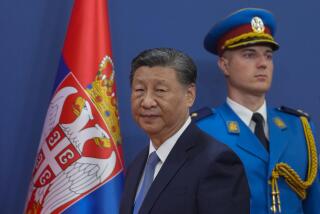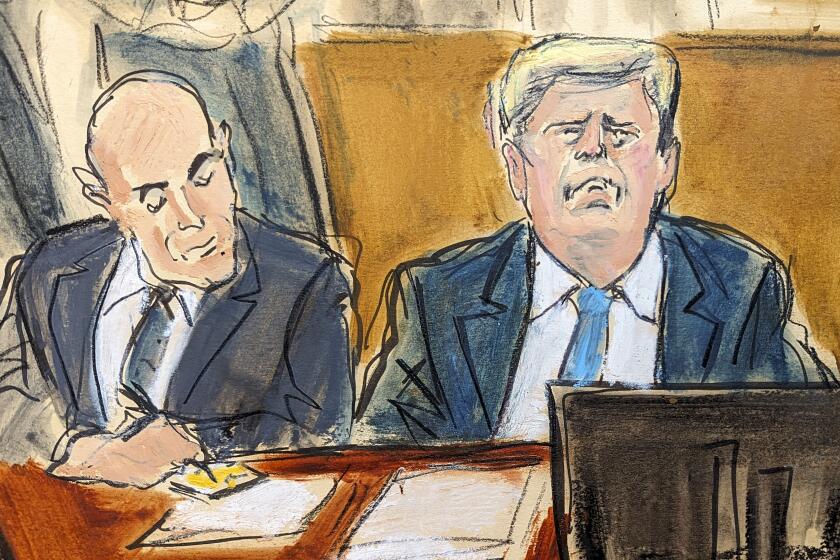Americans Get a New Look at Hussein
Americans on Wednesday night got their first extended look in years at Iraqi President Saddam Hussein, who appealed for peace as the United States continued to prepare for a war to oust him.
In a rambling interview with Dan Rather of CBS News, Hussein showed little of the menace that marked his appearances before the Persian Gulf War in 1991, when he vowed to wage the “mother of all battles.” He wore a dark suit with a striped tie rather than the military uniform and black beret he often dons.
Though he wore civilian garb, Hussein appeared resigned to war. The Iraqi dictator was firm in rejecting exile to prevent a U.S.-led invasion, a plan floated by some Arab leaders and endorsed by the White House. “I was born here in Iraq.... We will die here. We will die in this country and we will maintain our honor -- the honor that is required -- in front of our people.”
The highlights of Hussein’s comments have been made public in recent days. He again denied Bush administration claims that Baghdad is engaged in a clandestine effort to develop and produce poison gases, germ agents and nuclear weapons in defiance of repeated United Nations resolutions.
Hussein insisted that his government has fully cooperated with U.N. inspection teams that have searched hundreds of Iraqi sites since November. It is the Bush administration, he said, that is pushing “the huge lie ... against Iraq about chemical, biological and nuclear weapons.”
It wasn’t the statements that made news, but just that Hussein had granted the interview and that Americans were able to see the man who has been an object of derision for more than a decade. He has been portrayed by the Bush administration as an incarnation of evil willing to kill his own people with poison gases, and whose regime, with its alleged weapons of mass destruction, threatens peace efforts across the Middle East.
But as he sat in a white chair edged in gilt, Hussein appeared calm and solemn, polite and solicitous. His message, over and over, was that both he and Iraq are innocent victims of U.S. aggression.
U.S. officials fiercely denied that portrayal, and they denounced Hussein’s apparent charm offensive as self-serving propaganda, not a serious proposal to advance peace. Earlier, the interview sparked an unusual exchange between the White House and CBS over who was using whom.
Hussein, who controls the state-run media in Iraq, presumably hopes that the interview will help influence international opinion. Antiwar sentiment appears to be growing, especially outside the United States, and the U.S. and Britain are fighting in the U.N. Security Council for a resolution to tacitly authorize the use of force against Iraq.
“The conventional view is that Saddam is afraid, so he’s using the interview to reach out for support,” said Steven Black, who spent seven years as a U.N. weapons inspector in the 1990s and who has studied Hussein. “But I think it’s the opposite. He thinks he’s winning right now.”
Black said Hussein, who has not traveled outside Iraq in more than a decade, has seen little to convince him that his days really may be numbered. Hussein, after all, believes he was not defeated in the 1991 Gulf War.
“Think about the information coming at him now,” Black said. “Mass international demonstrations against a war. People calling for more time for inspections. He’s faced down U.S. administrations in the past. He’s seen military buildups in the past. He has no data point in favor of him making real concessions. He has every reason to think he’s going to tough this out and someone will find a soft solution that will leave him in power.”
In the interview, which took place over three hours Monday in a Baghdad palace, Hussein repeatedly denied that Iraq has missiles able to fly more than 93 miles, as chief U.N. weapons inspector Hans Blix concluded last week. Hussein thus appeared to defy Blix’s demand that Iraq begin to destroy a newly built fleet of 100 or so Al-Samoud 2 missiles by Saturday.
“There are no missiles that are contrary to the prescription of the United Nations in Iraq,” he said.
A clear Iraqi refusal to destroy the missiles would provide political ammunition for those who support White House claims that only military force will pry Hussein’s grip from his weapons of mass destruction.
The CBS interview provided a rare unscripted view of Hussein, who last met U.S. journalists, including Rather, 13 years ago. Hussein’s last known meeting with an American was in 1995, when then-Rep. Bill Richardson, now governor of New Mexico, visited the Iraqi leader to win the release of two imprisoned Americans. Hussein gave a brief interview several weeks ago to a sympathetic British politician.
The Iraqi president rarely appears in public, and many of his speeches and other appearances have a ritualistic quality. He often is shown firing a weapon, or astride a horse, or meeting soldiers or children. Such footage, as well as his ubiquitous portrait in homes and public places, feeds the image he seeks to portray as a warrior and father figure to the Iraqi people.
The sit-down with Rather gave little new to the CIA analysts, doctors and other U.S. officials who regularly update psychological profiles of Hussein for insights into how he may behave and why. “I don’t think we need any further information on the mind of Saddam,” a U.S. intelligence official said.
Jonathan Tucker, a former bioweapons inspector in Iraq who is now a fellow at the U.S. Institute of Peace in Washington, said the interview provided further evidence that Hussein is a wily leader, not a madman.
“He’s definitely a survivor, and he’s clearly very shrewd,” Tucker said. “I think it would be premature to write him off.”
Hussein denied any links to Osama bin Laden and the Al Qaeda network, as the administration has alleged.
“We have never had any relationship with Osama bin Laden, and Iraq has never had any relationship with Al Qaeda,” he said.
And in a striking attempt to claim the high ground, Hussein challenged President Bush to a live televised debate over the need for war and the standoff over inspections. He even proposed that Rather moderate such a debate.
“I have enough problems already,” Rather replied.
White House officials refused the offer, calling it a ridiculous attempt to stall. But they later sparred with CBS over an apparent White House request to put a representative on the air to rebut Hussein on the newsmagazine “60 Minutes II” Wednesday.
The White House and CBS offered up slightly different versions of what happened. But they agreed that in the end, CBS said it would welcome President Bush, Vice President Dick Cheney or Secretary of State Colin L. Powell on the program, while the White House wanted to send a less senior spokesman. CBS rejected that offer.
“We regret that,” White House spokesman Ari Fleischer said of CBS’ decision. “Saddam Hussein is a liar and a propagandist, and therefore the White House thought it was appropriate to have the voice of the administration in the same story so the propaganda can be dispelled.”
Fleischer congratulated Rather for getting what he called a “serious journalistic interview with Saddam Hussein,” but said it was appropriate only for an administration spokesman to appear because “there is not a moral equivalent between the dictator Saddam Hussein and the elected leaders of our democracy.” Hussein’s comments, he said, “should be rebutted as propaganda.”
Fleischer said the flap is just the first of many times in the coming weeks that the U.S. media will have to face difficult decisions on how to treat Iraqi propaganda. Live TV journalists, in particular, he said, “must think through the implications of putting liars on the air” without immediate rebuttal.
Tom Rosenstiel, director of the Project for Excellence in Journalism, said CBS had acted appropriately. “It’s journalism,” he said. “CBS has conducted an interview that is an enormous public service for we as Americans to understand who it is we’re possibly about to go to war with.”
Interviewing Hussein, Rosenstiel said, “is not the same as giving him moral equivalency” to the U.S. president. Americans who view the interview may be “as unpersuaded and perhaps even appalled” as they were by Hussein’s appearances before the Gulf War.
White House officials, he added, have “more than ample opportunity to get their story out to the American public before and after this interview airs.”
*
Staff writer Elizabeth Jensen in New York contributed to this report.
More to Read
Start your day right
Sign up for Essential California for news, features and recommendations from the L.A. Times and beyond in your inbox six days a week.
You may occasionally receive promotional content from the Los Angeles Times.







